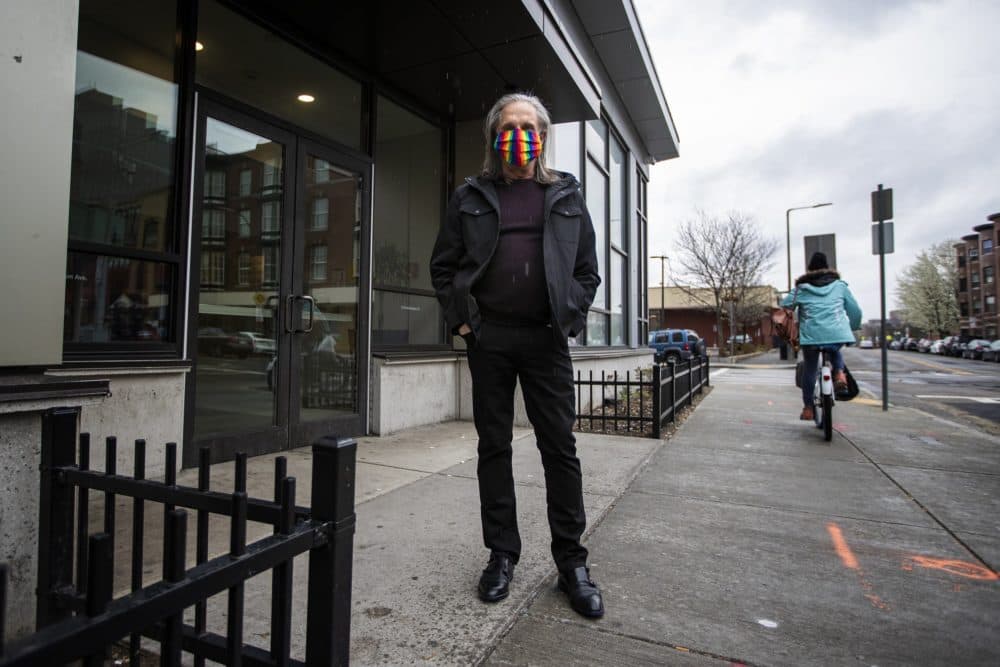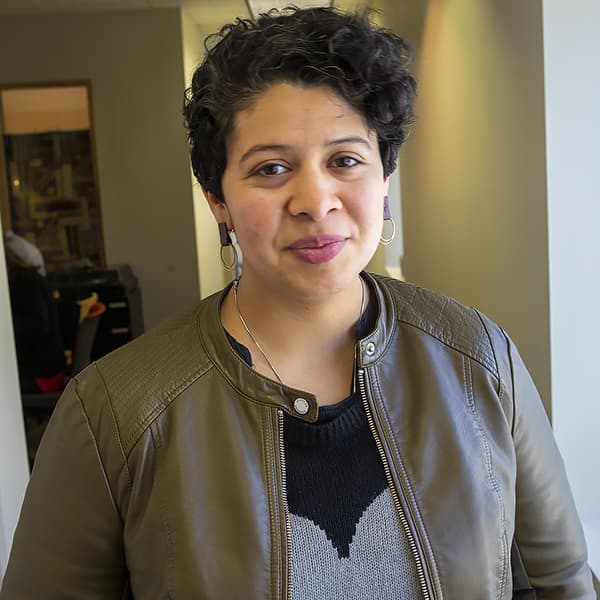Advertisement
Coronavirus Coverage
Surviving — And Thriving — Alone During A Global Pandemic
Resume
The flashbacks began recently for Rob Quinn.
He heard someone on the news recommend people not share utensils. In that moment, his mind was transported, from his living room to a hospital in 1993 when people left food trays outside doors marked with red. They were afraid to walk in.
“It really has just started to hit me,” Quinn said. “I've kind of lived through this kind of experience before in the early '90s with HIV AIDS. I'm a long-term survivor...it’s actually, it's been kind of challenging this week because a lot of stuff I see on the media is slightly triggering.”
Quinn lives alone in a small studio, not far from Boston Medical Center. He can hear ambulances coming and going. He remembers the isolation of living and working in New York during an earlier deadly epidemic that kept killing those in his community. Now, as someone with a compromised immune system, social distancing is a mandatory part of his life. He knows how lucky he is to have a roof over his head. He works out and tries to not watch the news too much, but the time alone is getting to him. Then, a friend came by to borrow his car to go grocery shopping.
It made all the difference in the world.
“Just to see another human face to face, to have a conversation,” Quinn said. “We maintained social distance. We normally would give each other a big hug. That's been hard for me. Like, when you're a hugger, it’s like an automatic instinct, like for some people shaking a hand. I really have to work on that. But it was just nice to see him.”
Living day by day in the time of the coronavirus outbreak has a different texture for those of us that live alone. There’s no escaping yourself. You’re confronted by your own thoughts. It compounds anxiety. Some days feel like the movie "Groundhog Day" where Bill Murray, as Phil Connors the weatherman, relives the same day over and over again.
That's why these days, connection is as important as a good meal, said Emily Shea, commissioner of Boston’s Age Strong Commission.
“People are reaching out because they need to be connected to resources, especially resources around food or making sure that they can get medications delivered,” Shea said. “But beyond those basic necessities, people are also reaching out because they are lonely. It's a time, I think, where everybody's feeling a certain level of anxiety. And so people are also reaching out to us just to talk. And because they just want to connect with somebody.”
The Age Strong Commission partners with nonprofits in the city to help meet this need for connection, organizations such as Little Brothers – Friends of the Elderly (LBFE) and FriendshipWorks. Both groups have volunteers who call folks in the city checking in by phone and virtually. Single-person households make up 28 percent of all households in the United States, according to census data.
“We're in such unsettled times,” said Beth Glick, a Framingham resident who lives alone. “Like if the whole world was to implode, we're alone. I think innately as humans when you're in a time that feels hard, you're used to connecting with other humans and other people and feeling like, ‘OK, we're in this together.’”
Everyday, Glick first checks in with herself. She does yoga and tries her best to fill her metaphorical cup before making a point to fill that of others. She's is a licensed clinical social worker who works as an assistant principal at an elementary school in Lexington. She has two grown daughters. She and several others in the area have started online support groups to help people cope with stress and connect. There’s no exchange of money, just an opportunity to share.
Her group meets once a week, virtually, and focuses on adults who live by themselves.
It's not growing quickly, but the number of people contacting her by email and Facebook just to talk certainly has. The range of what people are feeling is from mild worries to barely able to get themselves out of bed in the morning.
“It is neighbors helping neighbors,” Glick said. “So the word ‘counseling’ is not used, the word ‘therapy’ is not used. It's really safe spaces and support and strategies and helping each other.”
Her strategies are not unfamiliar. Gratitude. Good sleep. Stretching. She said she even picked up her guitar for the first time in years and started writing a song. She keeps a journal and asked herself: “Who do I want to be when this [pandemic] ends?”
“I think there's isolation and being alone,” Glick said. “And then I think there's the opportunity for capacity and growth connection with people we've never connected with. There's also a slowing down and stripping away and becoming our best selves out of this.”
She knows that she comes from a place of privilege. Many people can’t work from home. Whether due to having kids or their job or financial stress, they can’t use this moment to reflect, but they can still seek those small moments of joy.
It's what's helped me get through this alone.
I’ve had deep lows and a few victories. That daily bike ride by the water. Catching up with an old friend. Letting myself cry. Cooking black beans like my mother makes. My thoughts can be quiet company or my own worst enemy. Yet as we face down the most human of fears, being alone, dying alone, and our own mortality, I realize I’m more afraid of loss than I am of death these days. I miss seeing people's smiles. I miss hugs. I also know I can't control any of it, so instead I let my mind wander as I cook. It's become a balm, a meditation, that allows me to create something beautiful.
Quinn told me he often tells people he’s OCD, but not the kind you would think.
“Mine is optimism, confidence, and determination,” Quinn said. “It’s more of an attitude for me. That’s how I’ve approached any hurdle that I’ve come across in my life.”
And Glick keeps her spirits up so she can in turn lift the spirits of others.
“I think the biggest takeaway I've had in talking with anyone...is what's going to give you meaning? What's going to give you purpose each day?” Glick said. “Because the biggest other thing I've learned and I know other people have talked a lot about is paring down to living in the 'now'...just really being in, what's in this day, in this hour, in this moment and living it, because that's going to make it sustainable.”
This segment aired on April 10, 2020.
